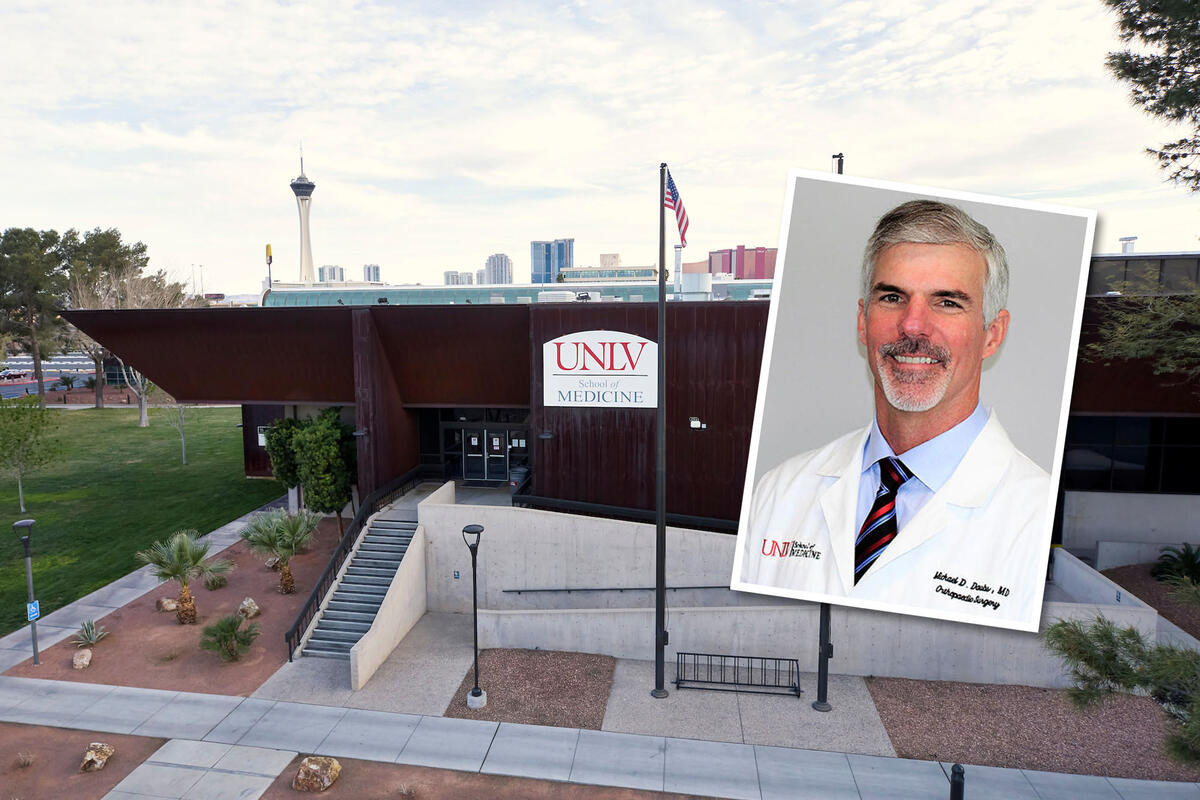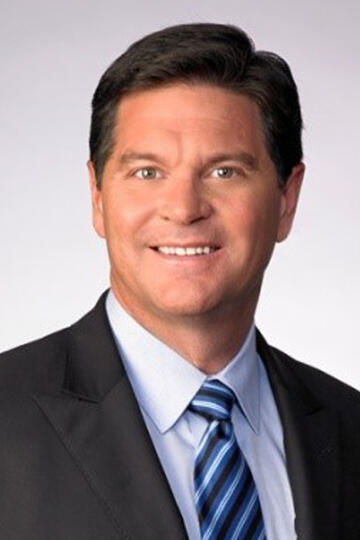The Kirk Kerkorian School of Medicine at UNLV, which graduated its first class of physicians in May and currently has the construction of a state-of-the-art medical education building well underway, has reached yet another milestone — a $2.5 million gift has created the school’s first endowed chair.

The Optum Dr. Tony and Renee Marlon Endowed Chair in the Department of Orthopaedics reflects an investment that the donors shared. OptumCare Nevada is the state’s largest multispecialty medical group. Dr. Marlon, the former chief of cardiology at UMC, founded Sierra Health Services, which became part of UnitedHealthcare.
Dr. Michael Daubs, professor and chair of the Kirk Kerkorian School of Medicine department of orthopaedics, has been installed as the first holder of the endowed chair.
“To be awarded the first endowed chair is really an honor,” said Daubs, a Las Vegas native who created the first orthopaedics residency program in Nevada. “The endowment allows me and our faculty to build the program further. My hope is that it leads to other department chairs being endowed as well.”
Dr. Marc Kahn, dean of the School of Medicine, said that endowment funds will play a large role in the success of the school.
"They provide support for medical education and research today, tomorrow, and far into the future,” he said. “Endowments are investments whose earnings are allocated each year to help support the program or area designated, while the remaining money remains in the endowment fund and continues to earn interest (the gift’s principal is not touched). As a result, the endowment lives on forever.”
Given the volatility of state funding, Annette Carter, the medical school’s senior director of development, noted that endowed chairs can provide the margin of excellence for faculty leaders to invest in their programs, faculty, students, and research. She said the effects of the philanthropy of Optum and Tony Marlon will spread out like a pebble dropped in a pond, so that 100 years from now, people, especially patients, are still being touched by their actions.
Longstanding tradition
The tradition of endowed chairs dates at least as far back as A.D. 176, when Roman emperor Marcus Aurelius created one endowed chair for each of the major schools of philosophy: Platonism, Aristotelianism, Stoicism, and Epicureanism. The practice was acquired by the modern university system in 1502, when endowed chairs were established at Oxford and Cambridge, and in 1546 when King Henry VIII created endowed chairs in medicine and basic science.
Dr. Robert McBeath, president of OptumCare’s Mountain West Region and CEO of Southwest Medical Associates, said “Optum couldn’t be prouder” to support an endowed chair along with Dr. Marlon, with whom he has a long-standing relationship. He recalled the two graduates of UNR's medical school, going together to talk to the Nevada Legislature about the need for a medical school in Las Vegas. He called the endowed chair a “very natural step” toward supporting better, more cost-effective health care. He said the musculoskeletal system research currently underway by Daubs “is incredibly important.”
OptumCare Nevada has more than 450 local health care providers through OptumCare Specialty and Primary Care and Southwest Medical, plus access to a network of contracted providers through OptumCare Network of Nevada for Medicare Advantage patients.
Dr. Marlon, who came to Las Vegas in 1972 as chief of cardiology at Southern Nevada Memorial Hospital (now UMC), said he helped fund the endowed chair ”to make a difference” in the medical school moving forward. He noted it made sense for him to endow a chair in orthopaedics because he is a “walking orthopaedic miracle. I’ve had both a hip and knee replacement.”
In 1984, Dr. Marlon founded Sierra Health Services, where he was chairman of the board and chief executive officer. Sierra, which had between 5,000 and 7,000 employees and more than $4 billion in revenue, was comprised of a family of health-related subsidiaries, including Health Plan of Nevada, Nevada’s largest health maintenance organization (HMO). In February 2008, Sierra and its subsidiaries became part of UnitedHealthcare. Dr. Marlon was a consultant to United through February 2009. He is president of the Tony and Renee Marlon Charitable Foundation, which distributes nearly $2 million in grants annually.
Dr. Marlon said he has a “high regard for Daubs both professionally and personally.”
As a board-certified orthopaedic surgeon, Dr. Daubs, who has published more than 100 scientific journal articles and medical textbook chapters related to the treatment of the spine, specializes in treating adult and pediatric spinal disorders. Outside of the operating room, you’ll often find him teaching at the Kirk Kerkorian School of Medicine. Thirty years ago, he set a career goal to return to his hometown of Las Vegas and start an orthopaedic program — and he has.
Recent grads
Daubs calls the founding of the first orthopaedic surgery program the highlight of his career. The first class of four fully trained, board-eligible orthopaedic surgeons just graduated from the Kirk Kerkorian School of Medicine residency program in June.
One of those residency graduates is a Henderson native, Dr. Brandon Romero.
“Dr. Daubs is a great teacher,” he said. “Working with Dr. Daubs has been an awesome experience. When he does surgery, he’s good about explaining why he’s doing it. It’s easy to see what he does and mimic that. But it’s a hard thing to know why you should do something. He helps you develop a thought process: 'This is why I’m doing this.'”
Romero, a former pitcher for Southern Utah University, plans on doing a fellowship in shoulder and elbow surgery at the University of Pennsylvania before returning to practice in Southern Nevada.
Dr. Jordan Miller, a Southern Nevada native and member of the Kerkorian School of Medicine charter class who graduated in May, begins the residency program founded by Daubs this summer. As a medical student, he watched Dr. Daubs do a several-hours-long scoliosis surgery. “He was so skilled. Other surgeons would have wanted to just sit down after a challenging case like that, but he took the time after the case to teach me about scoliosis. He took the time to answer questions. That really impressed me. I know he will use this endowed chair to make the residency program the best that it can be.”
How Endowments Are Made
In the world of public universities, the endowment is the insurance policy that provides perpetual funding for excellence in programming, scholarship, faculty, operations, and other important needs. While not literally an insurance policy, the endowment is built from philanthropic gifts that are invested by a professional investment company under the direction of the UNLV Foundation’s Board of Trustees. The trustees also establish the annual payout percentage; this year that amount is 3.5 percent. The difference between the amount that can be spent and the amount earned is then re-invested into the principal of the endowment to grow it even further.
As an example, if Bob and May Jones give a gift of $100,000 to endow a scholarship in the Kirk Kerkorian School of Medicine at UNLV and the interest earned on the principal is 8 percent, 3.5 percent ($3,500) of that will go to the scholarship recipient and the remaining 4.5 percent ($4,500) will go back into the principal of the endowment ($100,000) to grow it. The principal is now worth $104,500. Since an endowment exists in perpetuity, the principal will continue to grow (based on stock market returns) over time ensuring a solid future for a student for many, many years to come.
Endowments may be funded with cash, stock, or other appreciated assets, and as part of an estate plan/will.
To learn more about endowments and giving at the Kerkorian School of Medicine, contact Annette Carter at 702-895-0211 or annette.carter@unlv.edu.




